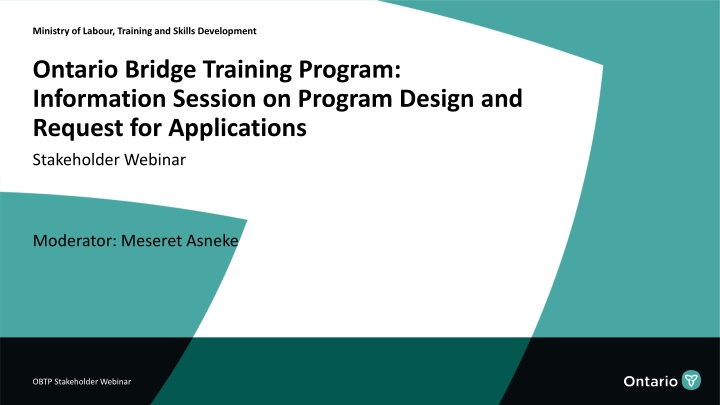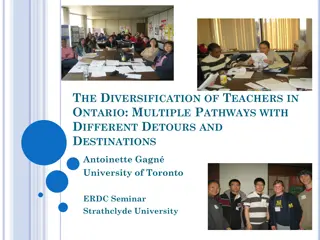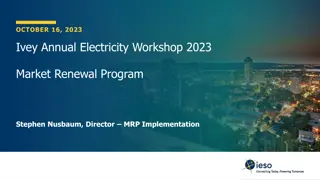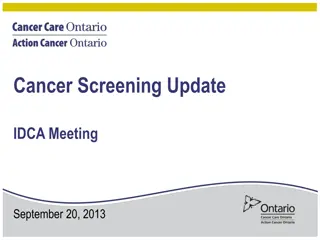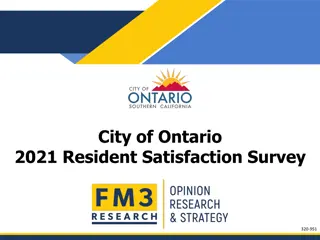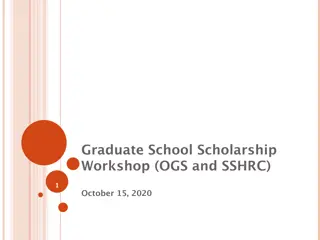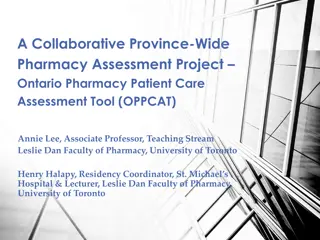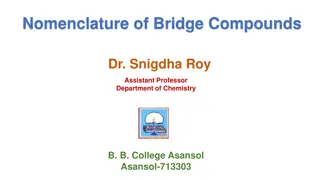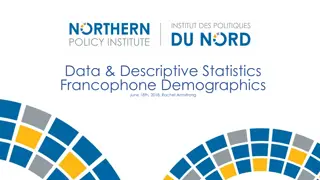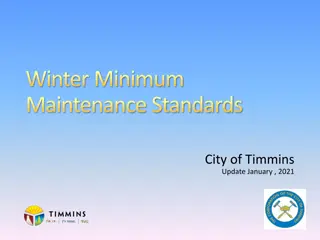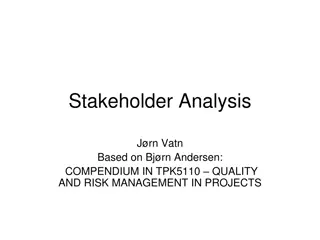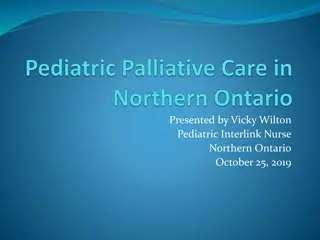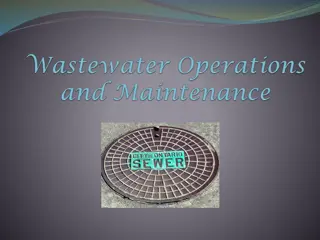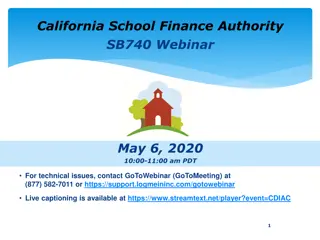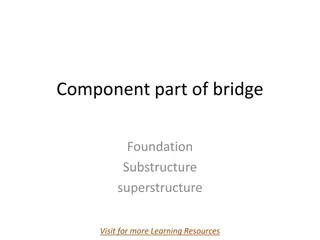Ontario Bridge Training Program Stakeholder Webinar Overview
Ministry of Labour, Training, and Skills Development in Ontario conducted a stakeholder webinar to present the Ontario Bridge Training Program (OBTP). The webinar outlined the program's purpose, objectives, design, and the upcoming Request for Applications. It provided insights into the submission process through Transfer Payment Ontario (TPON). The OBTP aims to assist internationally-trained immigrants in finding suitable employment in regulated or high-skill occupations by offering bridge training projects. The program has yielded positive outcomes, with many participants securing jobs in their field and obtaining licensure in regulated occupations.
Download Presentation

Please find below an Image/Link to download the presentation.
The content on the website is provided AS IS for your information and personal use only. It may not be sold, licensed, or shared on other websites without obtaining consent from the author.If you encounter any issues during the download, it is possible that the publisher has removed the file from their server.
You are allowed to download the files provided on this website for personal or commercial use, subject to the condition that they are used lawfully. All files are the property of their respective owners.
The content on the website is provided AS IS for your information and personal use only. It may not be sold, licensed, or shared on other websites without obtaining consent from the author.
E N D
Presentation Transcript
Ministry of Labour, Training and Skills Development Ontario Bridge Training Program: Information Session on Program Design and Request for Applications Stakeholder Webinar Moderator: Meseret Asneke OBTP Stakeholder Webinar
Ministry of Labour, Training and Skills Development AGENDA Topic Presenter Time Agenda and Housekeeping Rules Meseret Asneke 5 mins Welcome and Objectives Gail Parkins Grant David Cronin 5 mins OBTP Background and Program Components with Q&As Lilit Simonyan Mario Bruyere 45 mins Break N/A 10 mins Request for Applications Overview with Q&As Rifky Rosensweig Ying Wang 45 mins Demo: Transfer Payment Ontario Submission Process Raman Singh 20 mins Final Questions All 10 mins Next Steps and Closing Remarks Gail Parkins Grant 5 minutes 2 OBTP Stakeholder Webinar
Ministry of Labour, Training and Skills Development TODAY'S OBJECTIVE To outline the purpose and objectives of the Ontario Bridge Training Program (OBTP) To provide a background on the program To outline the OBTP program design To provide an overview of the OBTP Request for Applications launching February 16, 2021 To provide an overview of submission process and requirements through the Transfer Payment Ontario (TPON) system 3 OBTP Stakeholder Webinar
Ministry of Labour, Training and Skills Development OBTP Program Details OBTP Stakeholder Webinar 4
Ministry of Labour, Training and Skills Development 2019-20 Key Facts ONTARIO BRIDGE TRAINING PROGRAM (OBTP) - PURPOSE AND OBJECTIVES Ontario invested $25M to deliver 64 Bridge Training projects supporting over 7,500 participants. OBTP helps highly skilled internationally-trained immigrants (ITIs) in regulated or high-skill non-regulated occupations find commensurate employment in their field or related field, without duplicating their previous education and training. 2019-20 Program Outcomes Over 6,500 participants completed a bridge training project. The program is designed for ITIs, including permanent residents, naturalized Canadian citizens, Convention refugees and refugee claimants who are eligible to work in Ontario. Almost 5,200 obtained employment in their field or related field. OBTP provides services to participants who have high English language proficiency (CLB level 7 and up), post-secondary degrees and work experience from outside of Canada. Almost 1,000 participants achieved licensure in regulated occupations. Source: MLTSD OBTP Data 5 OBTP Stakeholder Webinar
Ministry of Labour, Training and Skills Development BRIDGE TRAINING COMPONENTS Bridge Training projects will combine the following components to help ITIs achieve licensure and employment: Language and Credential Assessment - May be conducted by occupational regulatory body in regulated occupations Occupation-specific Academic or Technical Training - Usually delivered by/in partnership with a post- secondary institution Workplace Culture and Communication - Employers involved in developing curriculum Connection to Employers - Internships, mentoring, job shadowing, clinical placements (where required for licensure) Exam Preparation - For regulated occupations Employment Support - Resume, cover letter, interview skills, job search, etc. 6 OBTP Stakeholder Webinar
Ministry of Labour, Training and Skills Development Research Evidence BACKGROUND Foreign credential devaluation, language skills, and perceived fit with the Canadian workplace continue to be barriers for ITI labour-market integration. (Source: Public Policy Forum, Jan 2020) The Ontario Bridge Training Program has been in existence for over two decades. Since 2003, Ontario has funded over 350 projects serving over 70,000 highly skilled ITIs in over 100 professions to help ITIs integrate quickly into the Ontario economy. Many ITIs are underemployed relative to their levels of education and professional competencies. (Source: Policy Options, Jan 2020) As a much-needed program, OBTP continues to address Ontario s labour and skills shortages, skills mismatches and pervasive underemployment of ITIs. Over the years, the program has undergone a number of reviews and evaluations. ITIs face significant obstacles to employment, earning less than Canadian born workers, despite having higher levels of education (Source: Ontario360, 2020) In response to the recommendations from the reviews, the ministry is improving OBTP by evolving the accountability framework, improving access to the program and placing particular focus on commensurate employment outcomes. 7 OBTP Stakeholder Webinar
Ministry of Labour, Training and Skills Development KEY AREAS OF PROGRAM DESIGN Program Vision: Highly-skilled ITIs are seamlessly integrated into the Ontario workforce. Program Goal: To provide highly-skilled ITIs with the supports and services to achieve licensure and obtain commensurate employment in their respective field of training/expertise or related field in a timely manner. Further context: 1. Improving employment outcomes for ITIs (focus on commensurate employment; combination of technical/academic training and occupation-specific employment supports; focus on partnerships ) 2. Improving access and removing barriers to participation (elimination of fees for non-technical/academic training; financial supports to low-income participants) 3. Introducing a Performance Measurement Framework (introduction of Performance Measurement Framework; introduction of a case management system) 8 OBTP Stakeholder Webinar
Ministry of Labour, Training and Skills Development 1 IMPROVING EMPLOYMENT OUTCOMES FOR ITIs Establish two categories: Service Delivery Projects (formerly Getting a Licence and Getting a Job funding streams) and Changing the System Projects. 1. All projects are required to offer occupation-specific training (including occupation-specific English language training for Francophone participants) directly or in partnership with another organization providing such training. 2. All projects are required to provide specialized occupation-specific assisted employment services (including pre- and post-employment) to all participants, based on participant need. 3. Focus on priority sectors and occupations requiring highly-skilled talent. 4. To improve the foreign qualification recognition of international talent, involve key stakeholders (e.g., employers/associations and regulators) as partners in design, assessment, curriculum development and placements, and promote partnerships among stakeholders. 5. 9 OBTP Stakeholder Webinar
Ministry of Labour, Training and Skills Development 2 IMPROVING ACCESS AND REMOVING BARRIERS TO PARTICIPATION To bring OBTP in line with other EO programs and services, improve access and reduce the financial burden on participants accessing the program the ministry will: 1. Eliminate all fees for non-technical / academic training and provide employment-focused services at no cost to the participants Provide financial supports to low-income participants to address non-tuition financial barriers to program participation, e.g., transportation, emergency childcare cost, academic credential assessment and translation of international academic documents. Emphasize digital and hybrid delivery modes and asynchronous scheduling options. 2. 10 OBTP Stakeholder Webinar
Ministry of Labour, Training and Skills Development 3 - INTRODUCING A PERFORMANCE MEASUREMENT FRAMEWORK To ensure consistency and quality in OBTP service delivery throughout the province, the ministry will implement a performance measurement framework (PMF) that will support OBTP goals and outcomes in a transparent and accountable manner. The OBTP PMF sets out three broad dimensions of service delivery success for OBTP: 1. Effectiveness to measure service impact, i.e., what the service achieves for the participants (e.g., commensurate employment achieved, licensure achieved) ; Customer Service to measure participant satisfaction with the accessed services; Efficiency to measure whether the service is accomplishing its goals in the best possible way The PMF will be implemented in phases and projects will be reviewed annually based on performance and demand. 2. The ministry will also introduce a case management system to track specific outcomes of individual participants in the program and leverage data analytics. 3. 11 OBTP Stakeholder Webinar
Ministry of Labour, Training and Skills Development PROGRAM CATEGORIES The OBTP will fund projects that fall under two separate categories: Service Delivery Projects Changing the System Projects Category A - Service Delivery Projects Service Delivery projects deliver direct services to ITIs to address barriers that they face in obtaining licensure/certification and commensurate employment in regulated occupations, or commensurate employment in high-skill non-regulated occupations. Successful projects generally target one occupation or sector. Service providers will be required to develop participant service plans that include all the participant-facing service components (described in the next slide) based on participants needs and goals. Participant-facing service components will be delivered in-person, online and through a combination of in-person and online methods of delivery. All service components will be delivered in Ontario. 12 OBTP Stakeholder Webinar
Ministry of Labour, Training and Skills Development PROGRAM CATEGORIES CONT D Participant-facing service components for Service Delivery Projects: Information and referral to Employment Ontario (EO) and other relevant programs and services Occupation-focused recruitment (including assessment, orientation and service planning) Occupation-specific pre-employment services Occupation-specific essential and technical skills training Occupation-specific English-as-a-Second language training (Francophone projects only); and workplace culture and communication training Occupation-specific employment services (including mentoring, job matching and placement) Sector-focused retention services and ongoing case management (post-employment services) 13 OBTP Stakeholder Webinar
Ministry of Labour, Training and Skills Development PROGRAM CATEGORIES CONT D -2 Category B - Changing the System Projects OBTP Changing the System projects are one-time initiatives that enhance the fairness and effectiveness of Ontario s institutions in integrating ITIs into the sector or provincial workforce. Such projects do not provide direct service delivery to participants. Changing the System Projects with a local focus are not eligible for funding and will be redirected to other relevant programs, e.g., the Ontario Labour Market Partnerships (OLMP). Projects targeting systemic change normally involve umbrella or multi-stakeholder organizations to ensure the broad-based support required to achieve systemic and sector-wide impact and outcomes. Such initiatives may include projects that assist groups of employers, occupational regulatory bodies, or post- secondary educational institutions to enhance their capacity to integrate ITIs effectively and in a fair and transparent manner. 14 OBTP Stakeholder Webinar
Ministry of Labour, Training and Skills Development ALIGNMENT WITH OTHER GOVERNMENT INITIATIVES The Ontario Bridge Training Program is in-scope of the Workforce Development Action Plan along with other Employment Ontario initiatives. As announced in Spring 2020, the government is developing a Workforce Development Action Plan to ensure that Ontario s changing economy has a secure supply of talented workers now and in the future. The economic and workforce impacts of the COVID-19 pandemic have highlighted the importance of this work and will be considered as part of the Workforce Development Action Plan, to make our system more robust and adaptable to current labour market conditions. The aim of the Action Plan is to review the ministry s suite of training programs such as Ontario Bridge Training Program and workforce development features to strengthen the system to achieve better outcomes for businesses, workers and communities. Part of this work will include engagement with key workforce development stakeholders and partners. 15 OBTP Stakeholder Webinar
Ministry of Labour, Training and Skills Development DISCUSSION POINTS AND PROPOSED ACTIONS Discussion Point Proposed Actions Some existing programs may need to adjust foci to meet new ministry objectives The ministry places special focus on helping participants find commensurate employment in a timely manner. It is the delivery of a full spectrum of services (including pre- and post-employment supports, occupation-specific technical skills training, sector-focused retention services, etc.) that help achieve this goal. Organizations that provide only some components (e.g., career exploration, mentoring) are encouraged to partner with successful proponents for delivery of their services. Alternatively, organizations may explore funding opportunities through other EO programs. Engagement of employers in smaller and remote communities can be challenging The ministry is interested in more projects delivering services in smaller and remote communities and encourages successful proponents to work collaboratively with local organizations to leverage labour market insight/gaps and industry demands, notably in small and remote communities, including seeking mentorship and placement opportunities. 16 OBTP Stakeholder Webinar
Ministry of Labour, Training and Skills Development DISCUSSION POINTS AND PROPOSED ACTIONS CONT D Discussion Point Proposed Actions Online-only delivery can be challenging for some participants, and for the service delivery of some program components (simulation labs, placements, language testing, etc.) To improve access to bridge training, the ministry encourages service providers to use blended delivery modes, where feasible, including in-person, online training and through a combination of in-person and online methods of delivery. Some service providers may have challenges in providing a full spectrum of employment supports and /or developing and delivering technical training The ministry encourages development of partnerships among stakeholders to improve employment outcomes and training service coordination: o E.g. employment services, including mentoring, can be delivered directly by the applicant organization or by a partner organization o Non-post-secondary organizations can offer technical training directly or in partnership with a public college or university 17 OBTP Stakeholder Webinar
Ministry of Labour, Training and Skills Development Questions and Answers Program Components, 18 OBTP Stakeholder Webinar
Ministry of Labour, Training and Skills Development Break 19 OBTP Stakeholder Webinar
Ministry of Labour, Training and Skills Development OBTP Request for Applications OBTP Stakeholder Webinar 20
Ministry of Labour, Training and Skills Development REQUEST FOR APPLICATIONS OVERVIEW Event Details Date Launch Documents will be posted on the Employment Ontario Partners Gateway (EOPG) February 16, 2021 Applications will be available on the Transfer Payment Ontario (TPON) platform. Applicants may submit questions via email to bridgetraining@ontario.ca within the first three weeks after the launch on February 16. February 22, 2021 Questions February 16 - March 5, 2021 Response to Questions The ministry will post one Q and A document responding to all questions received. March 19, 2021 CFP Submission Applications must be submitted electronically through the TPON website. April 30, 2021 Deadline Applications received after the deadline will not be considered. 21 OBTP Stakeholder Webinar
Ministry of Labour, Training and Skills Development REQUEST FOR APPLICATIONS PACKAGE SUMMARY The 2021 OBTP Request for Applications will solicit applications for two (2) categories of OBTP projects: Category A Service Delivery Projects Category B Changing the System Projects The OBTP Request for Applications Package has three (3) parts: 1. Request for Applications Guidelines 2. Organizational Risk Assessment 3. Proposal Details that will include the following: a) Applicant profile information b) Project summary information c) Conflict of interest declaration d) Partnership letter template e) Application questions f) Budget instructions and template g) Project targets instructions and template 22 OBTP Stakeholder Webinar
Ministry of Labour, Training and Skills Development REQUEST FOR APPLICATIONS GUIDELINES The OBTP Request for Applications Guidelines (the Guide) will accompany the submission documents. The purpose of the Guide is to provide interested applicants with background information on the OBTP delivery model, eligibility requirements for proposals, submission instructions and evaluation criteria. 23 OBTP Stakeholder Webinar
Ministry of Labour, Training and Skills Development MANDATORY DOCUMENTS FOR SUBMISSION Required Description Conflict of Interest Declaration Letters from partner organizations Completed Project Targets Template 1. General Information Applicant Profile Project Summary 2. Organizational Risk Assessment Applicants must provide evidence of its operational policies, procedures and infrastructure in the following areas: Governance, Service Delivery, Financial, Legal, Technology, Privacy, and Human Resources. 3. Application question responses Each project category has a unique set of questions. All questions are to be completed. 4. Budget Each project category comes with a unique budget template which must be completed with explanations where appropriate. 24 OBTP Stakeholder Webinar
Ministry of Labour, Training and Skills Development SUBMISSION PROCESS Applications must be submitted by a single applicant. A single applicant can be a sole organization or a lead organization with a group of partners. Applicants must submit a proposal for each category should they wish to deliver projects under more than one category. Applicants must register for an account with the TPON system in order to access and complete the online application. A computer with internet access is required. o The ministry recommends that applicants register with the TPON system at least two (2) weeks prior to the submission deadline. It may take up to five (5) business days for the TPON system to complete the registration and provide access. o Applicants who already have an active account on TPON do not need to re-register. o Changes cannot be made once documents have been submitted. 25 OBTP Stakeholder Webinar
Ministry of Labour, Training and Skills Development APPLICANT ELIGIBILITY The application is open to broader public sector organizations such as municipal governments, publicly-funded postsecondary institutions and school boards, and not-for-profit organizations that meet the following criteria: o Have been incorporated for at least two (2) years. o Have an elected governing Board of Directors. o Have a history of providing programs/post-secondary programs to immigrants in Ontario. o Have bylaws that outline procedures for reporting and accounting to their membership or the public for the organization s operations and performance. o Satisfy the ministry that it has adequate governance structures and accountability processes to properly administer and manage public funds and to carry out the project consistent with the terms of the Transfer Payment Agreement. o Satisfy the ministry that it has relevant, accurate, and timely financial reporting and audited financial statements. 26 OBTP Stakeholder Webinar
Ministry of Labour, Training and Skills Development APPLICANT ELIGIBILITY CONT D The application is also open to registered for-profit organizations based in Ontario that meet the following criteria: o Have been incorporated for at least two (2) years. o Comply with relevant Ontario legislation and policies including those governing postsecondary education institutions. o Do not have debts to the Crown and payments due under governing legislation. If debt is owed, a rationale must be provided to the ministry through the application process, using the Organizational Risk Assessment. o Have a history of providing programs/post-secondary programs to immigrants in Ontario. o Satisfy the ministry that they have adequate governance structures and accountability processes to properly administer and manage public funds and to carry out the project consistent with the terms of the Transfer Payment Agreement. o Satisfy the ministry that they have relevant, accurate, and timely financial reporting and audited financial statements. 27 OBTP Stakeholder Webinar
Ministry of Labour, Training and Skills Development EVALUATION CRITERIA Applicants will be assessed through four (4) evaluation stages. Successful applications must meet all criteria and thresholds across all stages of evaluation listed below: Stage I: Mandatory Requirements This is a pass/fail stage in which applications will be reviewed for completeness. Applications that are missing any mandatory components will be excluded from further consideration during the evaluation process. Stage II: Organizational Risk Assessment Applicants will be required to submit evidence of operational policies, procedures and infrastructure in the following areas: Governance, Service Delivery, Financial, Legal, Technology, Privacy and Human Resources. The ministry will review the evidence to assess the applicant s capacity to successfully deliver the project over the entire duration of the agreement with the ministry. Organizations assessed to be high-risk will be excluded from further consideration in the evaluation process. 28 OBTP Stakeholder Webinar
Ministry of Labour, Training and Skills Development EVALUATION CRITERIA CONT D Stage III: Application Questions This stage represents 75% of the overall score of the Request for Applications . Each project category has a unique set of questions and different maximum scores. At this stage, a minimum threshold of 65% of the maximum score must be met in order to continue to the next stage of evaluation. Applicants will be scored based on how they meet the stated criteria for each question. Stage IV: Budget This stage represents 25% of the overall score of the Request for Applications . Each project category has a unique budget template and different maximum scores. At this stage, a minimum threshold of 65% of the maximum score must be met in order to be considered for funding. Applicants will be scored based on whether the funding request is a) justified, b) aligns with budget submissions of similar projects, and c) is balanced 29 OBTP Stakeholder Webinar
Ministry of Labour, Training and Skills Development EVALUATION STAGES SUMMARY Project Category Category A Service Delivery Category B Changing the System Max Total Score (100%) 336 240 Minimum Threshold % Overall Score Stages Max Points Passing Points I. Mandatory Requirements Pass Pass 100% N/A II. Organizational Risk Assessment Low risk Med. Risk Med. Risk N/A III. Application Questions Category A Service Delivery 252 164 65% 75% Category B Changing the System 180 117 65% 75% IV. Budget Category A Service Delivery 84 55 65% 25% Category B Changing the System 60 39 65% 25% 30 OBTP Stakeholder Webinar
Ministry of Labour, Training and Skills Development FINAL ASSESSMENT AND SCORING Only applicants whose submissions meet requirements and thresholds in all the stages will be considered successful applicants. Successful applicants will be ranked according to their final scores and considered for funding according to the budget templates submitted. The ministry will fund as many successful Category A and B proposals as it can without exceeding its funding allocation for the program. 31 OBTP Stakeholder Webinar
Ministry of Labour, Training and Skills Development DISQUALIFIED APPLICATIONS There is no appeals process to contest an OBTP funding decision; however, the ministry will provide applicants with an opportunity to request and receive feedback on proposals not selected for funding. Opportunity for debriefs with unsuccessful applicants will take place November 2021, once the results are out. Unsuccessful applicants interested in a debrief can make the request by sending an email to bridgetraining@ontario.ca between October 1- 29, 2021. Disqualified applications and any supporting documentation submitted by an applicant will not be returned to the applicant and will be destroyed. 32 OBTP Stakeholder Webinar
Ministry of Labour, Training and Skills Development TRANSFER PAYMENT ONTARIO (TPON) DEMONSTRATION Introduction - Transfer Payment Ontario (TPON) provides you with one-window access to information about funding opportunities that are available to you, how to apply for funding and how to check the status of your submission Registration - Any organization requesting funding from the Government of Ontario must be registered to TPON as per the Transfer Payment Operational Policy System Demo Live demo of the TPON system 33 OBTP Stakeholder Webinar
Ministry of Labour, Training and Skills Development Questions and Answers Request for Applications Process 34 OBTP Stakeholder Webinar
Ministry of Labour, Training and Skills Development NEXT STEPS FOR APPLICANTS The Request for Applications will be posted on the Employment Ontario Partners Gateway on February 16, 2021. Applications will be open on the TPON system on the week of February 22, 2021. Applicants must create an account on the TPON system to access the documents and apply. Applicants may submit questions regarding the via email to bridgetraining@ontario.ca between February 16 to March 5, 2021. The ministry will post a questions and answers document on March 19, 2021 in response to all questions submitted. All applications must be submitted electronically through the TPON website on or before 5:00pm EST on April 30, 2021. 35 OBTP Stakeholder Webinar
Ministry of Labour, Training and Skills Development Thank you for your time today. All enquiries to be directed to bridgetraining@ontario.ca 36 OBTP Stakeholder Webinar
